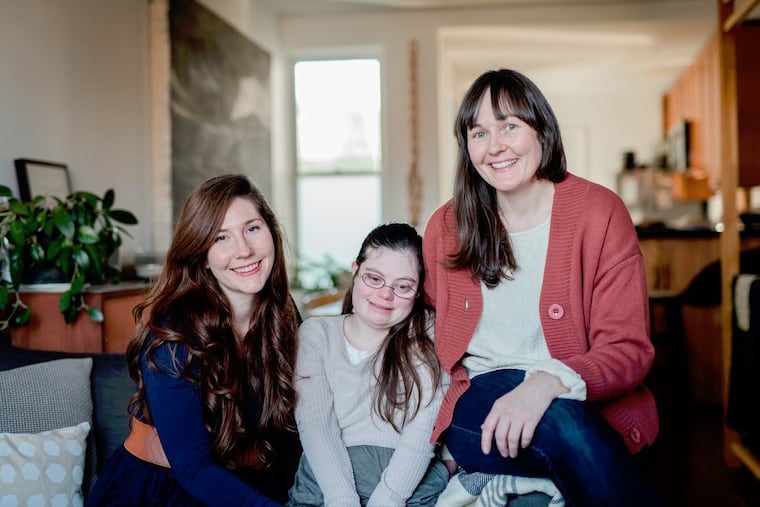Their tote bags sold out at Aerie — proving what people with disabilities can do
When one of their bags disappeared from the Aerie website, they worried they'd done something wrong. The real reason it was gone? "It sold out!"

If you heard cheers coming from Aston on December 10, it was from the studio of Dance Happy Design on Mount Road. That evening, Aerie — a sub-brand of the behemoth American Eagle apparel company — launched online sales of Dance Happy’s handmade canvas tote bags.
There were even giddier eruptions when the holiday season ended, because Aerie — pleased with how well the bags sold — decided to order more merch for 2020, said Dance Happy cofounder Emily Scott.
This is sensational news. Not just because a local business is getting national traction. But because one of its founders has a disability that, in the not too distant past, might’ve kept her from working at all.
» READ MORE: For those with Down syndrome, not all clothing is accessible. These researchers want to change that.
Not that anyone had entrepreneurship in mind when Dance Happy’s cofounders — Scott, Julia Tyler, and Liv Helgesen — first met in 2012. That’s when Scott, owner of a small boutique called Compendium (then located in Swarthmore, now located in West Chester) hired Tyler to work part-time at the shop.
Tyler, now 24, has Down syndrome and lives in Wallingford with her parents, Karen and Jim. Back then, she was a year from completing the special-needs program at Strath Haven High School, and her parents had to figure out what she would do upon graduation.
To help them, the school district hired Community Integrated Services (CIS), which partners with businesses and organizations to find jobs for people with disabilities. CIS approached Scott to see if Tyler might help out at Compendium.
Tyler is quiet, not very verbal, and moves slowly. Scott thought she’d do fine unpacking boxes when the weekly shipment of new inventory arrived. Working with a CIS job-support coach, Liv Helgesen, Tyler also tagged and hung clothing. The tryout turned into a weekly position.
But Helgesen, whose background is in art, wanted Tyler to be creatively challenged. So she set up an art studio in Compendium’s basement and taught her how to silk-screen images — cutout geometric shapes that Tyler created — onto canvas. Scott would then sew the finished fabric into funky tote bags, pillow covers, table runners, and the like, which were sold at Compendium, online, and at craft fairs.
In 2016, they formalized their partnership, naming it Dance Happy because Tyler, who is always happy, loves to dance. Revenues were not huge, but the product line was growing, as were Tyler’s abilities and sense of independence.
In 2017, I wrote about Dance Happy in “Falling Off the Cliff,” a four-part series about the lives of adults with developmental disabilities. While many can and want to work, only 34% of them are employed — and only 26% of those jobs are full-time. That’s because employers rarely see these men and women beyond their disabilities.
But Scott, at Compendium, saw in Tyler a focused, pleasant, and determined young woman who’d help make the store better. And Helgesen saw in her a bright, light spirit that deserved artistic expression.
Everyone deserves to be seen, heard, and known that way.
Last winter, Scott was invited to speak at “Embrace Ambition,” an annual event sponsored by the Tory Burch Foundation, which aims to support and inspire women entrepreneurs. Scott spoke of Dance Happy’s mission to “empower and celebrate differences.” In attendance was an Aerie executive who approached Scott afterward, asked about Dance Happy, and then later — unbeknownst to Scott — ordered a Dance Happy tote bag for her own inspection.
“She liked what she saw,” said Scott. A few months of discussions with Aerie followed, resulting in October with an order from Aerie for three styles of Dance Happy totes to be sold online during the 2019 holiday season.
“It was a thrill and also so intense,” said Scott about the short amount of time that she, Tyler, and Helgesen had to fill Aerie’s order. By corporate standards, the order was not huge, but “each item is handmade, and there’s only three of us doing the work, and I still had the store to run. We worked nonstop.”
Within days, one of their bags disappeared from the Aerie website, which worried Scott: Did a higher-up at Aerie not like it? Did a customer complain?
But then she learned the reason it was gone.
“It sold out!” she said.
Scott is now in talks with Aerie about a new order, and said that, this summer, a second large retailer will also begin selling Dance Happy products (she cannot identify the retailer until the company goes public with its own the announcement this spring).
What has been gratifying about these sales, she said, is that “they aren’t pity buys. These are corporations with high standards. They like that our merchandise is beautiful, and high quality and that there’s a great story behind it.”
As for Tyler’s reaction, well, she’s a women of few words (indeed, she is too shy to be interviewed, but will dance happily if you ask her to). But, said Scott, Tyler giggled excitedly when she saw photos of her totes on Aerie’s website.
Most importantly, said Scott, Tyler has started referring to the Dance Happy merchandise as “my work.” Which is new for her.
“She feels a real sense of ownership," said Scott. “She’s so proud."